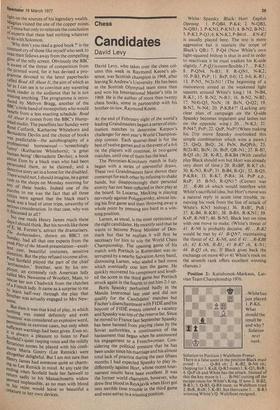Chess
Candidates
David Levy
David Levy, who takes over the chess column this week in Raymond Keene's absence, was Scottish champion in 1968, after leaving St Andrew's University. He has been in the Scottish Olympiad team since then and won his International Master's title in 1969. He is the author of more than twenty chess books, some in partnership with his brother-in-law, Raymond Keene.
At the end of February eight of the world's leading Grandmasters began a series of elimination matches to determine Karpov's challenger for next year's World Championship contest. Each quarter-final is for the best of twelve games and in the event of a 6-6 tie the players will continue, in two-game matches, until one of them has the lead.
The Petrosian-Korchnoy match in Italy began with a series of uneventful draws. These two Grandmasters have shown their contempt for each other by refusing to shake hands, but disappointingly their personal enmity has not been reflected in their play at the board. In Lucerne, Mecking is playing nervously against Polugayevsky, almost losing his first game and then throwing away a whole point by pressing too hard in a winning position.
Larsen, as usual, is the most optimistic of the eight candidates. He recently said that he wants to become Prime Minister of Denmark but that he realises it will first be necessary for him to win the World Chess Championship. The opening game of his match with Portisch in Rotterdam was interrupted by a nearby Salvation Army band, distressing Larsen, who sealed a bad move which eventually cost him the game. He quickly recovered his composure and levelled the score in the third game but Portisch struck again in the fourth to put him 2-1 up.
Boris Spassky performed badly in the Manila Interzonal last year and did not qualify for the Candidates' matches but Fischer's disenchantment with Fl DE and his boycott of FIDE events created a vacancy and Spassky was top of the reserve list. Since he moved to France last September Spassky has been banned from playing chess by the Soviet authorities, a continuance of the harassment that began when he announced his engagement to a Frenchwoman. Considering the political pressure that he has been under since his marriage and his almost total lack of practice during the past fifteen months I had expected Spassky to play Indifferently against Hort, whose recent tournament results have been excellent. It was the former world champion, however, who drew first blood in Reykjavik when Hort got into terrible time trouble in the third game and went astray in a winning position.
White: Spassky Black: Hort English Opening. I. P-QB4, P-K4; 2. N-QB3, N-QB3; 3. P-KN3, P-KN3; 4. B-N2, B-N2; 5. P-K3, P-Q3; 6. KN-K2, P-B4 (6 KN-K2 is usually played here. The text is more aggressive but it restricts the scope of Black's Q13.) 7. P-Q4 (Now White's own light-squared bishop is shut in and in order to reactivate it he must weaken his K-side slightly. 7. P-Q3 is more flexible.) 7... P-K5 ; 8. P-QN4, N-B3; 9. R-QN I, N-K2; 10. P-B3, PxP; II. BxP, 0-0; 12. 0-0, K-R 1 ; 13. P-N5, N(3)-N 1 ! (The beginning of a manoeuvre aimed at the weakened light squares around White's king.) 14. N-B4, R-K I ; 15. R-N2, N-R3; 16. B-N2, N-B2; 17. N(4)-Q5, NxN ; 18. BxN, Q-Q2; 19. B-N2, N-N4; 20. P-KR4?! (Lacking any clear plan of campaign on the Q-side Spassky becomes impatient and lashes out on the opposite wing.) 20 ...N-K3; 21. P-N4?, PxP; 22. QxP, NxP! (When making his 21st move Spassky overlooked this simple combination which wins a pawn.) 23. QxQ, BxQ; 24. PxN, BxQPch; 25. R(2)-B2, BxN ; 26. BxP, QR-N1 ; 27. R-B7, B-Q5 ch; 28. K-R2, B-KB4 (With careful play Black should win but Hort was already very short of time.) 29. RxBP, R-K7 ch; 30. K-N3, RxP; 31. B-B4, R-Q I ; 32. B-Q5, P-KR4; 33. R-K7, P-R4; 34. PxP e.p., RxP; 35. B-N5, R-QN I? (Correct was 35... R-R6 ch which would interfere with White's sacrificial idea, but Hort's move was a natural reply in acute time trouble, removing his rook from the line of attack of White's KN5 bishop.) 36. RxB!, PxR; 37. K-B4, R-KB 1 ; 38. B-R6. R-KN1; 39. KxP, R-N8 ?; 40. B-N5, Black lost on time with one move to make. (White's threat of 41. K-N6 is probably decisive. 40... R-R2 would be met by 41. B-QN7, maintaining the threat of 42. K-N6, and if 41 ... R-KB8 ch; 42 K-N6, R-BI; 43 R-R7 ch, K-N1; 44. B-Q5 ch, etc. If Black gives back the exchange on move 40 or 41 White's rook on the seventh rank offers excellent winning chances.)
Position 2: Katishonok-Markaus, Latvian Team Championship 1976.


































 Previous page
Previous page